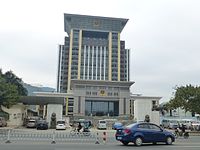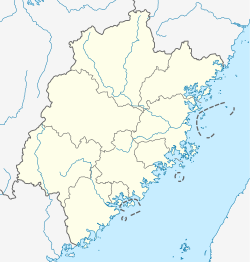Longhai City
|
Longhai 龙海市 |
|
|---|---|
| County-level city | |
| Location in Fujian | |
| Coordinates: 24°23′N 117°46′E / 24.383°N 117.767°ECoordinates: 24°23′N 117°46′E / 24.383°N 117.767°E | |
| Country | People's Republic of China |
| Province | Fujian |
| Prefecture-level city | Zhangzhou |
| Time zone | China Standard (UTC+8) |
| Longhai City | |||||||||||

Longhai's government offices
|
|||||||||||
| Traditional Chinese | |||||||||||
|---|---|---|---|---|---|---|---|---|---|---|---|
| Simplified Chinese | |||||||||||
| Literal meaning | Dragon Sea | ||||||||||
|
|||||||||||
| Transcriptions | |
|---|---|
| Standard Mandarin | |
| Hanyu Pinyin | Lónghǎi |
| Southern Min | |
| Hokkien POJ | Liông-hái |
Longhai is a county-level city within the prefecture-level city of Zhangzhou, in the south of Fujian province, People's Republic of China. Longhai comprises territory on both banks of the lower Jiulong River, although most of its area is on the right (southern) bank. The left bank yields to Xiamen before reaching the sea, the right bank becomes the south shore of Xiamen Bay and is home to the Zhangzhou Port tariff-free industrial export zone, in Longhai's Gangwei Town.
Longhai has a population of 801,100.
Following the revocation of the sea ban (haijin) in the late Ming, Yuegang (, lit "Moon Harbor") became a key port for China's silver trade with Manila in the Spanish Philippines. It was one of Fujian's four main commercial ports, located within presentday Haicheng in Longhai.
Present-day Longhai is the only county-level city within the prefecture-level city of Zhangzhou. It was formed from the merger of the former Longxi (龍溪縣) and Haicheng (海澄縣) counties on August 15, 1960.
Longhai's city main urban area is officially known as Shima Subdistrict. The city's executive, legislature and judiciary are located there, along with the CPC and PSB branches.
...
Wikipedia

